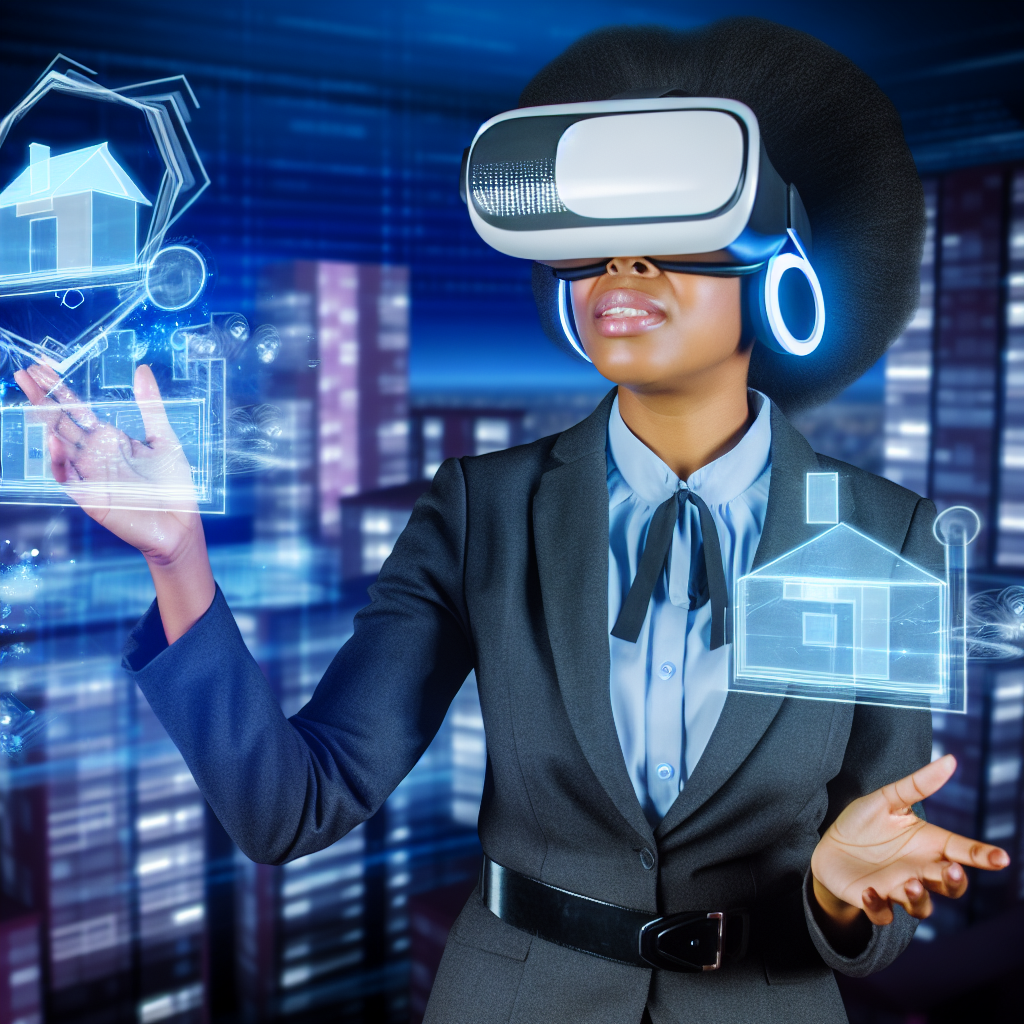Introduction to Virtual Reality and PropTech in Real Estate
Virtual reality (VR) is reshaping many industries, including real estate.
This technology provides immersive experiences that change how properties are showcased.
PropTech, or property technology, integrates digital solutions into the real estate sector.
It enhances the way buyers, sellers, and agents interact with properties.
The Emergence of Virtual Reality
VR technology has evolved significantly over the past decade.
This evolution has made VR more accessible and affordable for various industries.
In real estate, VR allows potential buyers to explore properties remotely.
As a result, it saves time and resources for both buyers and sellers.
Advantages of Using VR in Real Estate
One major advantage of using VR is its ability to create virtual tours.
These tours allow buyers to view multiple properties without leaving their homes.
Consequently, this expands the market reach for real estate agents.
Furthermore, VR helps buyers visualize spaces effectively.
They can understand layout and flow, making informed decisions.
PropTech’s Role in Integrating VR
PropTech companies are leading the charge in adopting VR technologies.
They develop platforms that incorporate VR for property listings.
These platforms significantly enhance user engagement and satisfaction.
For instance, Matterport creates 3D models that users can navigate in VR.
Such innovations are transforming traditional property viewings.
The Impact on Buyers and Sellers
VR technology benefits both buyers and sellers in diverse ways.
Buyers can experience a property in its entirety before making commitments.
This immersive experience builds buyer confidence and reduces hesitation.
Sellers can showcase their properties more effectively.
With VR, properties stand out in a competitive market.
Future Prospects of VR in Real Estate
The future for VR in real estate appears promising.
As technology improves, more immersive options will emerge.
For instance, virtual staging allows visualization of interior design possibilities.
Additionally, advancements in hardware will make VR even more realistic.
This growth will likely lead to wider adoption among realtors and buyers alike.
The Role of VR in Enhancing Property Viewing Experiences
Immersive Virtual Tours
Virtual reality transforms how potential buyers experience properties.
Instead of traditional viewings, buyers can now explore homes digitally.
This approach saves time and provides a comprehensive view of listings.
Immersive virtual tours eliminate geographical barriers for buyers.
As a result, buyers can view multiple properties in a single day.
Creating Emotional Connections
VR technology helps buyers visualize themselves in a space.
This visualization often leads to stronger emotional connections.
Potential buyers can experience the ambiance of each property.
Furthermore, it enhances the overall buying experience.
Emotional connections can significantly influence purchasing decisions.
Showcasing Unique Property Features
Virtual reality highlights distinctive aspects of a property.
Sellers can showcase features like open floor plans or gardens effectively.
VR allows for 360-degree views of rooms and outdoor spaces.
It helps in emphasizing the property’s layout and flow.
Buyers gain insights that static photos cannot provide.
A Cost-Effective Marketing Tool
Using VR for property viewings can reduce marketing costs.
Real estate agents save time while attracting a broader audience.
This technology appeals to tech-savvy buyers and investors.
Agents can present properties to multiple clients simultaneously.
Consequently, it streamlines the selling process significantly.
How VR Technology is Changing the Buyer-Seller Interaction
Enhancing Property Showings
Virtual reality revolutionizes property showings.
Buyers can experience homes without physically visiting.
They navigate spaces at their convenience and pace.
This flexibility allows for more informed decision-making.
Moreover, it saves time for both buyers and sellers.
Creating Immersive Experiences
VR offers immersive experiences that traditional methods cannot match.
Prospective buyers can visualize spaces like never before.
They can explore potential furniture layouts and decor styles.
This capability enhances emotional connections to properties.
As a result, buyers feel more invested in their choices.
Global Reach and Accessibility
Virtual reality expands the reach of real estate listings.
International buyers can tour properties remotely.
This feature opens up new markets for sellers.
Accessibility increases with VR technology for those unable to travel.
Individuals with physical limitations particularly benefit from this innovation.
Streamlining Communication
VR streamlines communication between buyers and sellers.
Real estate agents can impress clients with engaging presentations.
They can also highlight key features of properties effectively.
Instant feedback from clients becomes manageable and actionable through VR.
This interaction enhances trust and collaboration in the buying process.
Reducing Costs and Time
Using VR reduces costs associated with physical showings.
Sellers no longer need to stage homes multiple times.
Showings can be arranged quicker, yielding faster transactions.
Ultimately, both buyers and sellers save valuable time and resources.
Uncover the Details: Smart Home Technology For Enhancing Home Energy Efficiency
Case Studies: Successful Implementation of VR in Real Estate Marketing
Enhancing Property Visualizations
Real estate agents have started using virtual reality to enhance property visualizations.
For example, Skyline Realty implemented VR tours for their listings.
This innovation allowed potential buyers to explore homes from anywhere.
Consequently, their client engagement increased significantly.
Streamlining the Buying Process
Virtual reality also streamlines the buying process for clients.
Ellis & Co. Real Estate adopted VR in their sales strategy.
Now, buyers can virtually walk through multiple properties in one day.
This efficiency saves time for both buyers and agents alike.
Global Reach and Access
VR technology opens doors for international buyers.
Paladin Properties capitalized on this trend to attract overseas clients.
They hosted virtual open houses, allowing global access to listings.
This approach has significantly broadened their market reach.
Creating Immersive Experiences
Immersive experiences through VR can leave lasting impressions.
Aspire Realty created themed VR environments for their luxury listings.
These environments help buyers envision how they might use the space.
As a result, clients feel a deeper emotional connection to properties.
Feedback and Adjustments
Feedback from VR experiences helps improve future listings.
Many agencies utilize surveys post-virtual tours to gather input.
This feedback loop allows companies to make necessary adjustments.
Thus, agencies can better meet the desires of their clientele.
Find Out More: Understanding Smart Thermostats For Efficient American Residential Energy Use
The Impact of VR on Real Estate Investment Decisions
Enhancing Property Discovery
Virtual reality significantly transforms how investors discover properties.
Through immersive experiences, potential buyers can explore listings remotely.
This technology allows for realistic walkthroughs, enhancing engagement.
Investors can now assess properties without needing to visit physically.
Consequently, this saves time and resources for both investors and agents.
Improving Decision-Making Processes
VR tools provide detailed insights into properties.
These insights help investors make more informed choices.
For instance, simulations allow investors to visualize renovations easily.
They can see how design changes impact the overall space.
Moreover, virtual staging offers a glimpse into a property’s potential.
Increasing Market Reach
With VR, real estate investment opportunities expand significantly.
Investors can target markets beyond their geographical location.
This technology opens up options in foreign and distant markets.
Real estate firms leverage VR tours to attract global investors.
As a result, they increase competition and potentially drive up prices.
Facilitating Remote Collaboration
VR fosters collaborations among stakeholders, regardless of location.
Investors can discuss properties in real-time through virtual meetings.
This active engagement enhances negotiation efficiency.
Additionally, architects and developers can share designs swiftly.
Tools within VR ensure everyone remains on the same page.
Building Investor Confidence
Virtual reality instills confidence in investment decisions.
Investors can conduct thorough evaluations before finalizing deals.
Furthermore, VR demonstrations reduce uncertainty associated with unseen properties.
This transparency enhances trust between investors and sellers.
Finally, satisfying experiences encourage more substantial investments.
You Might Also Like: Smart Home Technology For Older Homes And Modern Retrofits

Challenges and Limitations of Integrating VR into Real Estate Practices
High Initial Costs
Implementing virtual reality technology incurs significant upfront costs.
Real estate companies must invest in hardware and software.
Moreover, training staff to use these new tools is essential.
This can deter small firms from adopting VR solutions.
Technology Adaptation Issues
Many professionals in real estate are not tech-savvy.
This lack of familiarity creates a barrier to effective adoption.
Additionally, older agents may resist technological changes.
As a result, they miss opportunities to enhance client experiences.
Content Creation Challenges
Creating high-quality virtual reality content requires expertise.
In-house teams may not have the necessary skills.
Outsourcing can lead to increased costs and time delays.
Ultimately, this can impede the speed of market response.
Client Acceptance and Interaction
Some clients prefer traditional property viewing methods.
This hesitation limits the effectiveness of virtual tours.
Additionally, clients might feel overwhelmed by technology.
Such perceptions can hinder their willingness to engage with VR.
Navigating Data Privacy Concerns
Protecting client data is a paramount concern in real estate.
Using VR platforms often involves handling sensitive information.
Companies must ensure compliance with data protection laws.
Failure to do so may result in legal repercussions and loss of trust.
Limited Market Awareness
Despite its benefits, VR is still relatively new in real estate.
Many potential users remain unaware of its advantages.
Educational efforts are necessary to promote understanding.
This includes showcasing successful case studies within the industry.
Uncover the Details: Smart Home Technology For Eco-Friendly Real Estate Solutions
Future Trends: The Evolution of VR and PropTech in Real Estate
Innovative Technologies on the Horizon
Virtual reality continues to advance, capturing the attention of the real estate sector.
New tools enhance property viewing experiences for potential buyers.
As technology progresses, virtual reality becomes more accessible to all users.
This accessibility drives further adoption in the real estate industry.
Integration of Virtual Reality and PropTech
PropTech companies play a pivotal role in integrating VR solutions.
This partnership enables real estate agents to offer immersive property tours.
Additionally, it allows developers to showcase projects before completion.
The seamless integration streamlines the selling process for all stakeholders.
Changes in Buyer Behavior
Buyers are increasingly seeking virtual experiences when shopping for properties.
Virtual tours save time and allow for better comparisons between options.
Consequently, agents who adapt to these trends gain a competitive edge.
Markets with robust VR offerings attract more interest from potential clients.
Future of Remote Showings
Remote showings are likely to become standard practice in real estate.
This change enhances convenience for both buyers and agents alike.
Virtual reality tools facilitate interactive and engaging showings from anywhere.
As trust grows in these technologies, remote transactions may increase.
Collaboration between Real Estate and Tech Startups
The collaboration between real estate professionals and tech startups is pivotal.
Startups bring innovative ideas and fresh perspectives to traditional practices.
This synergy fosters the development of revolutionary tools for the market.
Ultimately, it enhances the overall experience for buyers, sellers, and agents.
Anticipated Market Growth
As VR technology evolves, the PropTech market is expected to grow significantly.
Investments in virtual experiences are likely to surge in the coming years.
Furthermore, this growth will influence how properties are marketed and sold.
Ultimately, embracing VR will create new opportunities for real estate professionals.
The Lasting Effect of VR on the Real Estate Industry
Revolutionizing Property Showings
Virtual reality transforms property showings into immersive experiences.
Buyers can explore homes without leaving their current location.
Additionally, this technology allows for virtual staging of properties.
Consequently, potential buyers visualize spaces tailored to their preferences.
Enhancing Marketing Strategies
Real estate agents leverage VR to enhance marketing efforts.
High-quality virtual tours captivate potential clients effectively.
Agents can host virtual open houses, reaching broader audiences.
This marketing innovation increases property visibility and engagement.
Improving Decision-Making
VR aids buyers in making informed decisions about properties.
Clients experience a realistic sense of space and layout.
This insight reduces second-guessing during the buying process.
Ultimately, it helps clients find their ideal homes faster.
Fostering Remote Transactions
The ability to tour properties remotely gains importance in today’s market.
Investors from different regions can view properties seamlessly.
This aspect streamlines transactions, making them more efficient.
Therefore, geographical limitations no longer hinder potential deals.
Supporting Sustainability Initiatives
VR contributes to sustainable practices within the real estate sector.
By reducing the need for physical travel, it minimizes the carbon footprint.
Moreover, virtual walkthroughs decrease resource waste typically associated with traditional showings.
Thus, the industry moves toward more sustainable and eco-friendly practices.
Additional Resources
revolutionizing-real-estate-an-in-depth-look-at-proptech
What is Proptech in Real Estate: definition, types, benefits …




